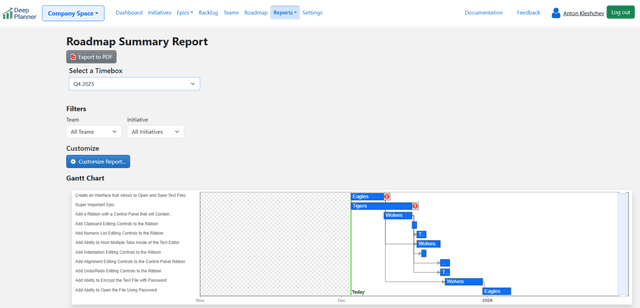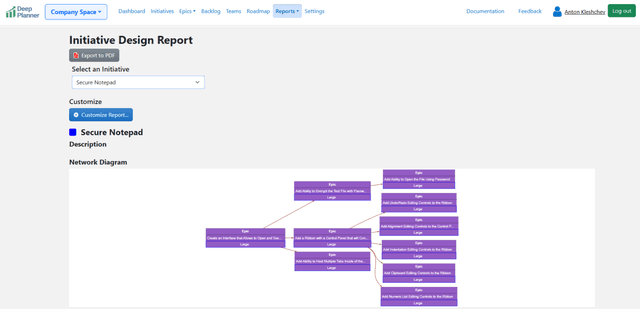Discover Automated Planning with Deep Planner
What is Automated Planning?
Most software teams still plan the old way: manually. Delivery dates are guessed, roadmaps live in scattered spreadsheets, and every change triggers another cycle of stressful meetings.
Automated planning changes that.
Automated planning is a way to streamline project management efforts by focusing on efficiency and automation in key steps of the mid- and long-term planning process, such as creating a company roadmap.
The following are key concepts:
- Delivery dates are calculated automatically, based on minimal inputs and featuring a highly accurate, effective algorithm
- Changes are adopted automatically with a minimally invasive and transparent impact
- A single roadmap page that features all plans available to all teams and stakeholders, promoting automatic and efficient communication
Our technology is innovative and unique with breakthrough benefits.
Why Teams Choose Automated Planning
Per our research and pilot usage with first clients, automated planning drastically improves and simplifies project management. It gives confidence and a sense of predictability to development teams and stakeholders.
- 70% less time wasted on planning meetings
- 80% less anxiety over making changes
- 95% less synchronization issues
- High ratings of employee satisfaction
Compatibility with Agile and Agile Frameworks
Deep Planner aligns with the core principles of Agile: embracing change, focusing on valuable customer outcomes, and relying on team contributions as essential input. The tool provides limited support for popular Agile frameworks such as Scrum and SAFe, offering a high-level planning layer that complements their iterative and incremental practices. For maximum benefit, Deep Planner works best with frameworks that include explicit existence of a roadmap and roadmap ownership by a Product Owner, such as the Milestone-Based Framework.
Automated Planning in Deep Planner
Deep Planner provides a highly effective and robust solution for automatic planning. We spent a significant amount of time mastering the algorithm and creating an app that can be practically used by any software development company.
Specifics of our app include:
- Standard inputs, such as features, teams, and timeboxes, that are common and standard in the industry
- Automatic calculations of estimate summaries, delivery dates, and recommended team assignments
- Adoption of changes through several factors, such as the order of execution, planning baseline, and team availability to ensure minimum invasion
- Preview of changes that allow you to perform prognosis and forecasts without final commitments
- A centralized and powerful dashboard with all your planning visible in a convenient Gantt chart
Use Cases
Automatic creation of roadmaps
The main feature of Deep Planner is the ability to generate company roadmaps automatically. Roadmaps guide teams and leaders by defining priorities and schedules and allocating work between teams based on capacity and estimates. Our schedules are designed to provide high-level guidance, perfect for med- and long-term company roadmaps.


Project Design
Deep Planner can be used as a convenient instrument to create a project design document that features estimates and a potential schedule. These documents can be used as a blueprint for clients, stakeholders, and managers to provide insights for major milestones and implementation—great for developers and technical leads. Given the flexibility of the tool, providing multiple versions of project design is realistic to ensure maximum client satisfaction.


Reporting
Deep Planner features roadmap summary and initiative design reports. Roadmap summary report conveniently provides all important data about the roadmap: features at risk, tickets in progress and completed items. Initiative design report contains a network diagram, effort summaries and effort pie chart. The purpose of this report is to provide technical information about project to a non-technical person in a readable and convenient format.


NEW Capability: LLM-Powered AI Assistant
In the recent release, we welcome smart and knowledgeable AI Assistant that was integrated into Deep Planner to help teams and leadership make informed decisions. Trained for accuracy and quality, it has insights about roadmaps, features, and schedules.
Features
Heavily trained for the most common Project Management needs:
- Obtains information about feature descriptions, estimates, or stories
- Gets feature schedules and roadmap data
- Views current priorities and risks
- Summarizes roadmap changes during a given period
